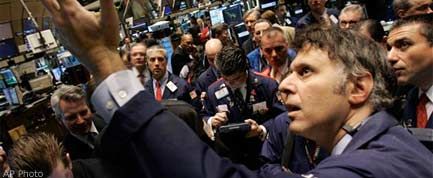Why Wall Street Barely Reacted to Osama bin Laden's Death

While President Barack Obama's announcement of the death of Osama bin Laden set off impromptu celebrations around the country, Wall Street took the news in stride, perhaps signaling its acceptance that the war on terror is far from over.
The Dow Jones industrial average, the S&P 500 and Nasdaq grew by only 0.4 percent, 0.5 percent and 0.4 percent, respectively, soon after opening on Monday. The value of the dollar rose against that of the euro and the yen, but fell against the pound.
The markets in Europe and Asia, some of which were open or opened shortly after Obama's special announcement late Sunday evening, ticked up slightly more significantly than the American markets. The most significant change happened to the Nikkei index of Japan, which gained 1.6 percent.
Each of these upticks was likely driven by expectations that bin Laden's death signals a slightly more stable environment in the Middle East, which could in turn stimulate oil trades and, perhaps, divert those American dollars spent on hunting bin Laden back into the U.S. economy.
"Still, compared to the enormous political and psychological significance of [bin] Laden's death, the stock market reaction was relatively muted," reported the New York Times.
Stock traders, it seems, did not get caught up in the euphoria of people in the streets when making investments this morning. "Basically, financial markets did not get worked up about this," Gur Huberman, a behavioral finance professor at Columbia University, told Life's Little Mysteries, a sister site to LiveScience. "As far as stock markets and currencies go, my impression is that the movements today have not been exceptional."
"The Nikkei went up by 1.57 percent, and that's nice but even that change is not truly exceptional," he said. Indeed, the Nikkei index is at its highest since a devastating earthquake and tsunami hit Japan on March 11, but not since long before.
Sign up for the Live Science daily newsletter now
Get the world’s most fascinating discoveries delivered straight to your inbox.
The muted financial response to bin Laden's death does not mirror the response to the 9/11 terrorist attacks. "When Osama bin Laden became a mass murderer on Sept. 11, the markets closed for two days, and then when they reopened they dropped by a few percentage points, so the news strongly affected those markets. But having killed him has not affected the markets much," Huberman said.
The difference, he explained, lies in the fact that the war on terror began on Sept. 11, but it did not end yesterday. "I don't think it's the end of the struggle with al-Qaida. It's not like Hitler who died with the end of the war -- this war is a very complicated and long process."
A reasonable bump
The market responses to these events -- the big drop in the case of 9/11 and today's small rise -- are perfectly rational on the part of investors, Huberman said. "I think the explanation lies in traditional economics theory: After 9/11, people had realistic expectations that the economy would slow down and resources would be diverted to the war machine, and in fact this is exactly what happened.
"But in the case of bin Laden's death, I don't see this as being the end of the war. It's a step in a very long process," he said. At this juncture, people do not expect resources directed toward the war on terror to immediately be diverted back to the economy.
The price of crude oil fell more significantly than stock markets rose, with a barrel of Brent crude falling 3.4 percent today. Al-Qaida threatens geopolitical uncertainty and supply disruptions, and according to Ric Spooner, chief market analyst at CMC Markets in Sydney, the death of its leader may be interpreted as easing those threats. "[Bin Laden's death] carries hope of reduced threats of terrorism and political risk in northern Asian and the Middle East," Spooner told Bloomberg News.
Still, even the effect on oil was relatively insignificant. The price of Brent crude is only the lowest since April 20.
This article was provided by Life's Little Mysteries, a sister site to LiveScience. Follow Natalie Wolchover on Twitter @nattyover.
Natalie Wolchover was a staff writer for Live Science from 2010 to 2012 and is currently a senior physics writer and editor for Quanta Magazine. She holds a bachelor's degree in physics from Tufts University and has studied physics at the University of California, Berkeley. Along with the staff of Quanta, Wolchover won the 2022 Pulitzer Prize for explanatory writing for her work on the building of the James Webb Space Telescope. Her work has also appeared in the The Best American Science and Nature Writing and The Best Writing on Mathematics, Nature, The New Yorker and Popular Science. She was the 2016 winner of the Evert Clark/Seth Payne Award, an annual prize for young science journalists, as well as the winner of the 2017 Science Communication Award for the American Institute of Physics.












